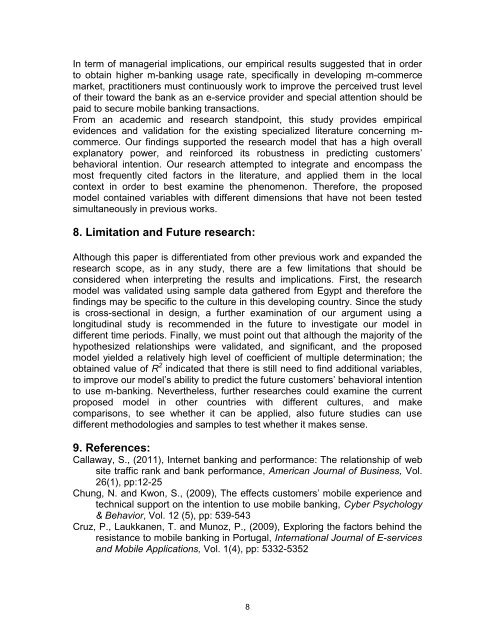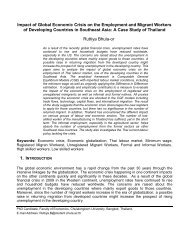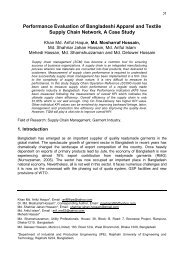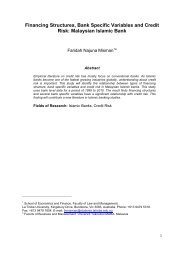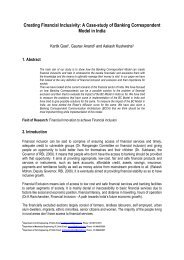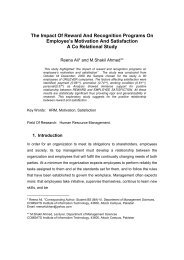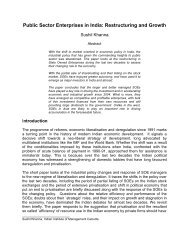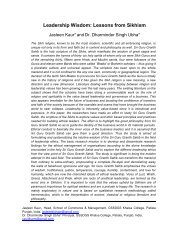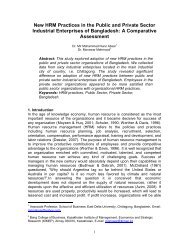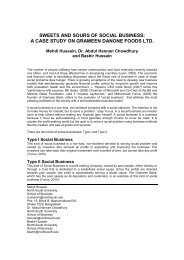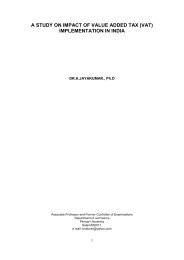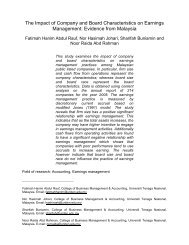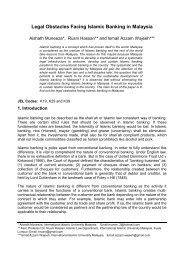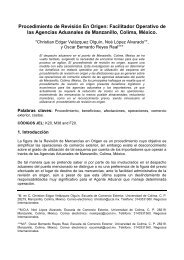An empirical examination of behavioral intention to mobile Internet ...
An empirical examination of behavioral intention to mobile Internet ...
An empirical examination of behavioral intention to mobile Internet ...
Create successful ePaper yourself
Turn your PDF publications into a flip-book with our unique Google optimized e-Paper software.
In term <strong>of</strong> managerial implications, our <strong>empirical</strong> results suggested that in order<strong>to</strong> obtain higher m-banking usage rate, specifically in developing m-commercemarket, practitioners must continuously work <strong>to</strong> improve the perceived trust level<strong>of</strong> their <strong>to</strong>ward the bank as an e-service provider and special attention should bepaid <strong>to</strong> secure <strong>mobile</strong> banking transactions.From an academic and research standpoint, this study provides <strong>empirical</strong>evidences and validation for the existing specialized literature concerning m-commerce. Our findings supported the research model that has a high overallexplana<strong>to</strong>ry power, and reinforced its robustness in predicting cus<strong>to</strong>mers’<strong>behavioral</strong> <strong>intention</strong>. Our research attempted <strong>to</strong> integrate and encompass themost frequently cited fac<strong>to</strong>rs in the literature, and applied them in the localcontext in order <strong>to</strong> best examine the phenomenon. Therefore, the proposedmodel contained variables with different dimensions that have not been testedsimultaneously in previous works.8. Limitation and Future research:Although this paper is differentiated from other previous work and expanded theresearch scope, as in any study, there are a few limitations that should beconsidered when interpreting the results and implications. First, the researchmodel was validated using sample data gathered from Egypt and therefore thefindings may be specific <strong>to</strong> the culture in this developing country. Since the studyis cross-sectional in design, a further <strong>examination</strong> <strong>of</strong> our argument using alongitudinal study is recommended in the future <strong>to</strong> investigate our model indifferent time periods. Finally, we must point out that although the majority <strong>of</strong> thehypothesized relationships were validated, and significant, and the proposedmodel yielded a relatively high level <strong>of</strong> coefficient <strong>of</strong> multiple determination; theobtained value <strong>of</strong> R 2 indicated that there is still need <strong>to</strong> find additional variables,<strong>to</strong> improve our model’s ability <strong>to</strong> predict the future cus<strong>to</strong>mers’ <strong>behavioral</strong> <strong>intention</strong><strong>to</strong> use m-banking. Nevertheless, further researches could examine the currentproposed model in other countries with different cultures, and makecomparisons, <strong>to</strong> see whether it can be applied, also future studies can usedifferent methodologies and samples <strong>to</strong> test whether it makes sense.9. References:Callaway, S., (2011), <strong>Internet</strong> banking and performance: The relationship <strong>of</strong> website traffic rank and bank performance, American Journal <strong>of</strong> Business, Vol.26(1), pp:12-25Chung, N. and Kwon, S., (2009), The effects cus<strong>to</strong>mers’ <strong>mobile</strong> experience andtechnical support on the <strong>intention</strong> <strong>to</strong> use <strong>mobile</strong> banking, Cyber Psychology& Behavior, Vol. 12 (5), pp: 539-543Cruz, P., Laukkanen, T. and Munoz, P., (2009), Exploring the fac<strong>to</strong>rs behind theresistance <strong>to</strong> <strong>mobile</strong> banking in Portugal, International Journal <strong>of</strong> E-servicesand Mobile Applications, Vol. 1(4), pp: 5332-53528


